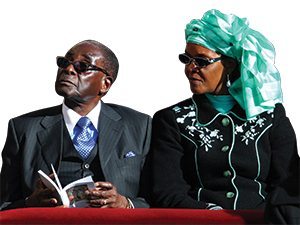
[miningmx.com] – SHARES in Zimbabwean gold mining firm, Caledonia Mining, appear vulnerable to a once-monthly giddiness, at least from November since when the stock has bounced between 80 Canadian cents and 65c/share.
According to the firm’s CFO, Mark Learmonth, the company could benefit from more institutional holders in contrast to the largely retail influence currently on the register, a legacy effect from when Caledonia was a different company (in different days).
Learmonth acknowledges investors are influenced by the political sound bites from Zimbabwean government officials, not least its president, Robert Mugabe, but he feels the political risk element in the stock is heavily over-cooked.
He may be right, but it seems as if Caledonia’s recent share weakness has had more to do with the things management does have control over: production, costs and its own hierarchy.
A board coup saw CEO Stefan Hayden replaced by incumbent, Steve Curtis, and the adoption of a new mine plan for Blanket, Caledonia’s 49%-owned gold operation, fully indigenised (empowered) and with plans to double production by 2021 to 80,000 ounces/year.
That would be a far cry from the under-performance in 2014 in which production fell to just over 40,000 oz from 45,000 oz previously. Learmonth acknowledges the adoption of the new mine plan was a contentious issue at board level, but he’s firmly backing Caledonia’s new COO responsbile for its provenance, Dana Roets.
Roets was formerly vice-head of Beatrix and Kloof gold mines when they were still owned by Gold Fields, and more recently was COO of Great Basin Gold, a company that collapsed in an unceremonious heap a couple of years ago.
Consequently, the proof of the pudding will be in the eating. Caledonia intends spending $70m of Blanket’s cash flow from now until 2021 expanding the mine. Net cash as of December 31 was C$28.8m, described by Learmonth as “an embarrassment’, so there’s no pressure on Caledonia’s balance sheet.
In fact, the company will continue to pay dividends from its cash pile although the dividend from Blanket has been suspended for this year, by agreement with the Zimbabwean investors who rely on it to service their vendor-financed investment in the mine.
“We want to rebuild confidence and achieve a growth story,’ said Learmonth. The plan is to extend Blanket by going downwards: completion of a verticle central shaft is scheduled for mid-2017 and production a year later.
If the production can stabilise and grow, and costs subsequently becalmed, Learmonth reckons Caledonia is a share that will offer capital growth. “We currently have a yield of 8%, but we believe we can take it down to 2% and get a premium rating,’ he said.










